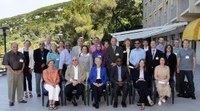 The workshop, 'Developing a Framework for an International Faculty Development Project on Education about Research in the Life Sciences with Dual Use Potential,' is part of a two-year project sponsored by the US State Department and directed by a committee of researchers, policy experts and science educators appointed by the US National Research Council, the research and operating arm of the National Academy of Sciences.
The workshop, 'Developing a Framework for an International Faculty Development Project on Education about Research in the Life Sciences with Dual Use Potential,' is part of a two-year project sponsored by the US State Department and directed by a committee of researchers, policy experts and science educators appointed by the US National Research Council, the research and operating arm of the National Academy of Sciences.
Some 30 participants – from Egypt, Italy, Poland, South Africa, Switzerland, the United Kingdom and the United States – shared a broad range of experiences on the subject. The goal was to draft a global framework for researchers and science educators on how to conduct and teach life sciences research responsibly.
As Rita Colwell, the project's committee chairperson, stressed in her introductory remarks, a "set of global guidelines for responsible life sciences research is essential today because research is occurring so rapidly and unevenly around the world." Colwell, who directed the US National Science Foundation from 1998 to 2004, is currently a distinguished professor at the University of Maryland at College Park and Johns Hopkins University Bloomberg School of Public Health.
In addition to Colwell, opening talks were given by Romain Murenzi, TWAS executive director, and Lida Anestidou, project director and senior programme officer at NRC's Institute for Laboratory Animal Research.
While participants acknowledged that the quality of research and training in the life sciences (and in many other fields) had improved significantly over the past few decades, they also agreed that a host of challenges remained. This, they emphasized, was especially true for developing countries, many of which were experiencing historic political and social change.
Recent events in Egypt, taking place during the "Arab Spring," were instructive and proved to be a particularly lively aspect of the discussion at the workshop. Participants, including Ismail Serageldin (TWAS Fellow 2001), director of the Bibliotheca Alexandrina (BA), Mohamed El-Faham, director of the Center for Special Studies and Programs at the BA, and Alaa Ibrahim, assistant professor of space astrophysics at the American University in Cairo, noted how students across Egypt had lent their voice to the urgent need for new frameworks not only for research but, more generally, for society.
Serageldin also noted that institutions such as the BA could contribute a great deal to positive change in Egypt. BA is a world-class centre of learning that houses 8 million books and 45,000 journals. It is also has a supercomputer, offers a supercourse in epidemiology, produces educational programmes for tv and radio, oversees a science museum and planetarium, and sponsors science clubs and fairs.
Participants expressed hope that the library and other similar educational institutions would continue to receive support from the government. They also hoped the same would be true for all the universities and research centres in Egypt, where funding is needed not only for daily operations but also to sustain institutional reforms.
Institutions of higher education such as Alexandria University and Cairo University, both of which have student populations that exceed 150,000, have suffered from a host of constraints, including inadequate funding, outdated equipment, and poor faculty and staff salaries. Meeting these challenges will likely be a prerequisite for building a strong foundation for safe and responsible life sciences research and training.
Egyptian researchers also face institutional obstacles, including lengthy delays for the approval of courses, which can take up to two years, and security-based restrictions on collaborative projects. Such barriers hinder international collaborations at a time when collaborative transnational research projects are increasingly important for the global advancement of science.
At the conclusion of the workshop, participants outlined a framework for developing a global course on conducting "responsible, safe and beneficial" research and teaching in the life sciences. The outline, which emphasized the importance of such issues as best practices in laboratory work and the need to promote international collaboration, will be further developed into an interim report from the NRC and formalized over the next year into a prototype course to be held in Egypt. The anticipated outcome is the creation of a training course that will be made available to countries worldwide.
For more information on the project and its progress, please see: http://dels.nas.edu/Study-In-Progress/Developing-Framework-International-Faculty/DELS-BLS-10-01.

